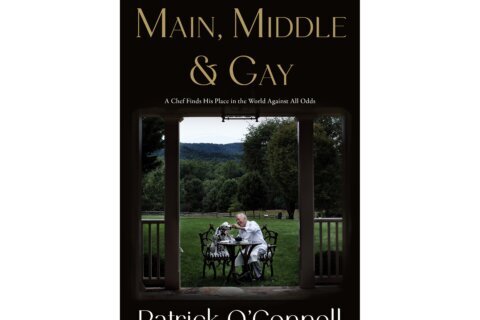Hear our full chat on my podcast “Beyond the Fame with Jason Fraley.”
He wrote and sang dozens of iconic classic-rock hits with his band Creedence Clearwater Revival.
This weekend, the legendary singer-songwriter John Fogerty rocks Wolf Trap on Saturday, Aug. 19.
The show marks his first tour since getting the rights back to all of his CCR songs earlier this year.
“We’re calling this tour ‘Celebration’ because of the fact that I’m now owning my songs for the first time in my life,” Fogerty told WTOP. “Any songwriter will tell you that it’s like finding your children. It’s a thing I’ve been fighting for 50-plus years. Back in the day, you don’t even realize you’re giving up the rights to your songs … I got pretty agitated about it back in the day and I’ve proceeded to try to get those rights back for a long time … Life is good.”
Born in Berkeley, California, in 1945, Fogerty grew up listening to classic rhythm and blues.
“I started writing songs when I was 8,” Fogerty said. “I was listening to the local rhythm-and-blues station before they had a thing called rock ‘n roll. I heard a commercial for a laundry product. The DJ said, ‘Do you got the wash day blues?’ … So I started writing this little ditty to the tune of the Muddy Waters-Willie Dixon riff … I studied and was really curious about the great songwriters in history … Hoagy Carmichael, Irving Berlin, people like that.”
He formed CCR in 1968 with brother Tom Fogerty on rhythm guitar, Stu Cook on bass and Doug Clifford on drums. Their self-titled debut, “Creedence Clearwater Revival” (1968), saw killer covers of “Susie Q” (originally by swamp rocker Dale Hawkins) and “I Put a Spell On You” (originally by R&B pioneer Screamin’ Jay Hawkins).
Their second album, “Bayou Country” (1969), saw Fogerty pen original hits with “Born on the Bayou” and “Proud Mary.” The latter of which was later memorably covered by the late Tina Turner in 1971. Even Kenny Chesney gave a shoutout in his 2003 song “Live Those Songs” with the lyric, “I’ll be rollin’ on a river with Creedence.”
“At the height of the Vietnam War, I had been drafted into the Army Reserves,” Fogerty said. “One day … I found my honorable discharge. I was so excited that I turned a cartwheel. I ran in the house, picked up my guitar, started strumming those chords … and the first thing out of my mouth was, ‘Left a good job in the city, working for the man every night and day’ … Within about 25 or 30 minutes I had finished almost the whole song of ‘Proud Mary.'”
CCR’s powerful third album, “Green River” (1969), featured more original hits penned by Fogerty. “Lodi” brilliantly described a nomad getting stuck in a small town during his travels, “Bad Moon Rising” foretold of ominous trouble on the horizon and the wailing title track “Green River” allowed Fogerty to dip himself into some nostalgic waters.
“I’d finally fallen into a place that felt warm and comfortable like a great plaid shirt, it felt like me, it had a little bit of Mark Twain Americana,” Fogerty said. “The single came out with ‘Bad Moon’ and ‘Lodi’ on the other side, but by the time I got to the third single, ‘Green River,’ I just went back and wrote about this place I had gone as a child many times with my family called Putah Creek in Northern California. I transmogrified it into the Green River.”
Their fourth album, “Willy & The Poor Boys” (1969), featured into the lyrics of “Down on the Corner” with the chorus, “Down on the corner, out in the street, Willy & The Poor Boys are playing, bring a nickel, tap your feet.”
“I opened the newspaper (and saw) this full-page ad said ‘Super Pooh Package’ with a picture of Winnie the Pooh,” Fogerty said. “I thought, ‘What if Winnie the Pooh had a little band and played music? He’d be Winnie the Pooh & The Pooh Boys’ … Somehow it morphed over time to Willy and not the Pooh Boys but the Poor Boys, so I started writing a song with those characters … I started visualizing a band playing down on the corner.”
The same album also featured the iconic anthem “Fortunate Son,” which has ironically been played at patriotic events but is actually quite anti-war and anti-privilege with the line, “It ain’t me, it ain’t me, I ain’t no senator’s son.”
“Common people are very suspicious of privileged people,” Fogerty said. “There was a war going on and there was a draft, so every 18-year-old male in America was under that threat … You’re seeing on the news saying, ‘Here’s Senator So and So getting his kid some cushy deferment’ … I wrote that in a very angry stance on the unfairness … The older I’ve gotten the more you can see how many wars are just business decisions that some tycoon wants.”
The band’s fifth album, “Cosmo’s Factory” (1970), brought arguably the deepest bench of songs. It was packed to the brim with hits: “Run Through the Jungle,” “Travelin’ Band,” “Who’ll Stop the Rain,” “Lookin’ Out My Back Door,” “Long As I Can See the Light,” “Heard it Through the Grapevine” and perhaps most famous “Up Around the Bend.”
“I would stay up very late into the night writing songs,” Fogerty said. “It just kicked me into gear … I think what happened was that I evolved. There was some sort of dimensional shift in my brainwaves and I literally went to that place that I’d only dreamt about and I was now able to do it … I gave it all the gasoline that I could.”
CCR’s sixth album, “Pendulum” (1970), not only featured the catchy upbeat tune “Hey Tonight” but also the all-time classic “Have You Ever Seen the Rain,” a melancholic lament on his quarreling band’s looming collapse. Like “Fortunate Son,” “Have You Ever Seen The Rain” recently surpassed one billion Spotify streams in March 2023.
“The band started to become more and more unhappy,” Fogerty said. “It was so unpleasant, especially for me, because when somebody starts to shine out of a group … the first thing they do is try to knock down that person … I decided to write a song about it. Here we were having our shining, sunny day that we had dreamed about since we were young, yet it seemed there was rain falling down all over it … That song is about my band breaking up.”
Indeed, Creedence Clearwater Revival broke up after their seventh album, “Mardi Gras” (1972), but it had amassed such a catalog that it earned induction into the Rock & Roll Hall of Fame in 1993. Meanwhile, Fogerty broke off solo to record nearly a dozen albums on his own, most famously “Centerfield” with the baseball stadium anthem: “Put me in coach, I’m ready to play!” In fact, Fogerty is reissuing his first two solo albums next week.
“There’s solo stuff (in the show at Wolf Trap this weekend), but really since I’m so happy with getting back the ownership of my earlier (CCR) songs, we sort of feature those a lot,” Fogerty said. “What I say at the beginning of the show is, ‘I just got my songs back and I’m gonna do all of them,’ which is pretty well true.”
Hear our full chat on my podcast “Beyond the Fame with Jason Fraley.”








